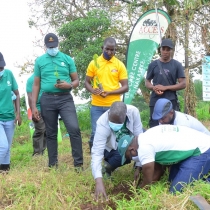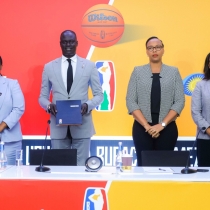
Is Final Investment Decision imminent? Where recent developments leave Uganda's Oil & Gas sector
1. Introduction
The business community eagerly awaits the final investment decision (“FID”) which will be a key milestone for Uganda’s oil and gas industry.
FID represents the point at which the International Oil Companies (“IOCs”) and the Government of Uganda (“GoU”) through the Uganda National Oil Company (“UNOC”) will commit to oil field development.
The project execution phase should commence shortly after FID with significant expenditure on building the production facilities,
the crude oil pipeline, refinery and the associated supplies and services.
Between US$ 10 billion and US$ 20 billion will be invested in the project in the first three years before the first oil flows. This is transformative and unprecedented, especially considering that this investment is equivalent to nearly two-thirds of Uganda’s gross domestic product.
Local and international investors have been positioning for the economic prospects that the development of Uganda’s oil
and gas sector will present.
A sizable number of entrepreneurs had actually embarked on investment in anticipation of arising business opportunities but they have had to weather heavy losses as a result of the delays in the sector taking off.
This article gives an update of Uganda’s recent oil and gas developments as well as examining when FID is likely to happen.
2. Disappointing 2019
2019 turned out to be a disappointing year for the business community and other stakeholders who had been optimistic that FID would be made before the year ended.
Instead, tax disputes created a wedge between the IOCs and the GoU casting doubt on the future of the country’s nascent oil and gas industry.
In news that dominated global business headlines, Total, China National Offshore Oil Corporation (“CNOOC’) and Tullow allowed the lapse of a sale and purchase agreement (“SPA”) on 29th August 2019.
Under this SPA, Tullow was to divest a significant portion of its stake in Uganda’s oil blocks to CNOOC and Total. This SPA had been entered into by Total and Tullow on 9th January 2017 with Total poised to acquire 21.57% out of Tullow’s 33.33% interest in the Lake
Albert oil blocks.
CNOOC exercised its right to pre-empt 50% of the transaction. As a result, Total and CNOOC would each increase their stake to 44.1% while Tullow would keep 11.8%.
The statement issued by Total at this link highlighted that since 2017, all the concerned parties had been actively progressing the SPA. However, despite extensive discussions with the authorities, no agreement on the fiscal treatment of the transaction had been
reached.
The deadline for closing the transaction had been extended several times, clearly demonstrating the endeavors of the parties to find an agreement. Total further announced on 5th September 2019 the suspension of all activities on the East African Crude Oil Pipeline (“EACOP”) including the tendering process following the collapse of the discussions with the GoU over the proposed farm down deal.
3. Troublesome taxation
The contentious issues that led to the meltdown of relations between the IOCs and the GoU in August 2019, further
delaying FID were mostly tax-related.
Since Uganda’s oil discoveries in 2006, there has been no single issue that has been a subject of such controversy between the government and the IOCs as tax. The oil tax regime has been revised over 7 times since 2008.
The tax changes have been piecemeal, sometimes with the government conceding ground to the IOCs and at other times withdrawing the concessions previously made.
As a result of these changes and related issues, a meeting of minds between the government and the IOCs on tax matters had remained elusive.
Government’s position was that Tullow had to pay capital gains tax (“CGT”) of US$ 167 million on its divesture of stake to Total and CNOOC pursuant to the 2017 SPA.
Industry pundits and the IOCs encouraged the government to look at this transaction as one that was primarily raising capital for reinvestment in Uganda’s oil and gas development. Taxing the arising proceeds was inconsistent with the country’s aspiration of attracting investment for oil and gas development.
Under this transaction, Tullow was remaining in Uganda albeit with reduced interest and a significant portion of proceeds from this sale of stake were to be used to fund its share of oil field and pipeline development costs.
Tullow offered to pay US$ 82 million protesting against government’s demand for US$ 167 million as excessive because it had not taken into account some prior costs that had to be included in the tax base.
Seeing no end to this dispute, Total’s global President and CEO Patrick Pouyanne met Uganda’s President Yoweri Kaguta Museveni in January 2019.
Amongst the concessions offered by Total was to top up an additional US$ 85 million to meet government’s CGT demand of US$167 million from Tullow so that this farm down could finalize. Unfortunately, the government and IOCs could not agree on the legal and tax modalities of Total’s offer creating further paralysis.
The IOCs were further concerned by government’s position that they would be unable to deduct for tax purposes a significant portion of costs that they would incur on acquiring Tullow’s oil interests. The IOCs expressed reservations on how this position would affect the project economics.
The IOCs were also disturbed by the 2017 amendment to the Income Tax Act to the effect that they would immediately have to pay income tax as soon as oil and gas production commenced regardless of whether they were in a tax loss position or not.
While this change would not affect the total undiscounted cash flows to the IOCs over the life of the project, it impacted the targeted net present value, internal rate of return and payback period which are key investment criteria to achieve the FID.
While the positions taken by the GoU were intended to secure the best deal for the people of Uganda, some industry observers considered that the government seemed oblivious of the economic impact these demands would have on the commercial viability of Uganda’s oil and gas project.
Speaking at the Uganda-Tanzania Business Forum in September 2019 in Dar-es-Salaam, Tanzania’s President John Pombe Magufuli also criticized Uganda’s technocrats for delaying the project because of “a small tax dispute” when both Uganda and Tanzania stood to benefit tremendously.
He requested for the urgent intervention of his Ugandan counterpart to resolve the matter.
Some also consider that the government had misjudged the timing of hardball negotiations ceding its power to control the negotiations directed towards FID to the IOCs. Prior to FID, IOCs are usually in a superior bargaining position because host countries are keen to move forward their discoveries to development and eventually production.
It is also at this time when IOCs are very risk averse, ensuring that their decisions are not questioned by their shareholders. The involvement of other parties like bankers at this stage assessing project bankability also weakens governments’ bargaining positions.
However, as soon as the IOCs invest their capital, governments regain their inherent control over the progress of projects.
4. Re-engagement between the IOCs and the Government
Both the IOCs and the GoU were however cognizant of the fact that a lasting standstill would benefit none and were engaging behind the scenes to look for a win-win resolution of the outstanding contentious matters.
In November 2019, Total’s President and CEO made his 3rd visit to Uganda in the year to meet President Yoweri Museveni. It is understood that Total highlighted that there were legitimate fiscal issues that had to be dealt with if Uganda’s oil project would move
to FID especially around how the fiscal regime affected the project return on investment.
Since this meeting, it is understood that both the IOCs and the GoU have engaged further to resolve the outstanding contentious issues. The deliberations between the parties moved on to 2020 and it is generally understood that at the time the coronavirus pandemic disrupted global travel and business in March 2020, a blueprint agreement between the IOCs and the GoU had been reached.
While details of the agreed positions are not in the public domain, it is speculated that the government conceded on a majority of fiscal issues that had led to a breakdown of relations with the IOCs in August 2019.
5. Global shocks to oil and gas industry
In April 2020, we released a publication that analyzed the impact of the falling crude oil prices on the global economy and Uganda’s oil and gas industry in particular. It can be found at this link.
At the beginning of March 2020, Saudi Arabia proposed to cut daily crude oil supply by an additional 3.6 million barrels through 2020 cognizant of weaker consumption due to the coronavirus pandemic. Russia objected as it wanted to produce more hoping that lower prices would drive some smaller U.S. producers towards bankruptcy.
Infuriated Saudi Arabia moved to teach Russia a lesson by pulling out of the OPEC+ alliance with effect from 1st April 2020. This alliance had placed a restriction on crude oil production since 2017. From 1st April 2020, Saudi Arabia began to drown the market with an additional 2 million barrels a day as well as discounting prices for customers in Europe, a key market for Russia.
This in turn precipitated a free fall of crude oil prices to historic lows.
Concerned that this rivalry would ultimately do more harm than good, Saudi Arabia and Russia struck a deal with other oil producing nations to slash production in the attempt to stabilize the market that had been upended by the pandemic.
Members of the OPEC and their allies, including Russia and Mexico, announced on 19th April 2020 their agreement to cut daily production by 9.7 million barrels effective 1st May 2020. The parties have to a large extent complied with these undertakings.
Oil prices have now rallied back to low $40s but this is still not enough for the IOCs to make sufficient economic returns on many projects. Reduced oil prices have seen the IOCs reduce their exploration and development expenditure and all the top 5 oil majors are projected to report losses in the second- quarter of 2020.
Oil field services providers too are limping and have downsized significantly. Schlumberger, the largest oilfield services company, is for instance on course to eliminate 21,000 jobs.
The company posted a loss of US$ 3.4 billion in the second quarter of 2020.
There is however optimism that by the end of 2020, the impact of the pandemic will reduce, helping crude oil prices to recover further. Unless global oil prices improve enough to enable the IOCs increase budgets for exploration and development expenditure, the anticipated progress of Uganda’s oil and gas sector may be derailed once again.
6. Tullow’s final exit from Uganda
On 23rd April 2020, Tullow and Total entered into a sale and purchase agreement pursuant to which Total would acquire Tullow’s entire interest in Uganda’s oil blocks in the Lake Albert development project including the EACOP.
This differed from the 2017 transaction where Tullow Oil was to remain in Uganda but with significantly reduced footprint.
Completion of this divesture was subject to the approval of both Tullow shareholders and the GoU as well as CNOOC’s
50% pre-emption rights. The consideration payable by Total to Tullow would be $575 million, with an initial payment of $500 million at deal closure and $ 75 million when the partners would take FID.
Tullow’s shareholders have since sanctioned the transaction with only the approval of the GoU remaining. It is understood that the CGT that will be payable by Tullow to the government on this transaction is under $ 20 million compared to the $ 167 million which would have been payable under the aborted 2017 SPA.
In a decision that surprised industry observers, CNOOC did not exercise its pre-emptive rights on the sale of Tullow assets, leaving Total with the dominant stake in Uganda’s oil and gas industry. Analysts have postulated various interpretations of CNOOC’s decision and the implications for Uganda’s oil and gas industry.
Some believe that with Total taking a dominant position, decision making on outstanding issues would be quicker. Others are wondering whether CNOOC could be looking at other opportunities in Uganda’s oil and gas value chain or even whether it has lost interest in Uganda’s oil and gas industry.
By taking on bigger stake, Total shoulders the burden of increased project risk and financing. Alternatively, Total may opt to divest part of the interest it has accumulated in Uganda’s oil blocks via a farm down. This could give rise to further tax problems delaying the progress of Uganda’s oil and gas industry once again. Such a further delay could be fatal to the project.
7. Status of the upstream projects
To move ahead, the FIDs for both the upstream production facilities and the EACOP must be made simultaneously to enable the transportation of crude oil to export markets and this is what the parties are aiming towards.
While attempts are underway to ensure that a crude oil refinery also goes ahead, it is generally understood that the crude oil pipeline
may be developed first. As already highlighted, it is speculated that the main issues of disagreement between the IOCs and the GoU that led to a meltdown of relations in August 2019 have been resolved.
The parties have now embarked on the finalization of the commercial agreements operationalizing the relationship between the parties already set out in the broader framework agreements like the Production Sharing Agreements.
Some of the commercial agreements being negotiated at the upstream segment level include new Joint Operating Agreements between CNOOC, Total and UNOC, the Power Purchase Agreements for excess electricity produced by the production facilities, the Common Development, Production and Cost Allocation Agreement.
In further positive news that the industry is moving ahead, Total recently issued a call for expressions of interest in the provision of engineering, procurement, supply, construction and commissioning services for the Tilenga field development project.
It is understood that 6 international EPC companies have already been prequalified and are expected to submit their bids for evaluation in furtherance of the call for the tender process. It is anticipated that following this, tenders for drilling contract packages and early works would be issued.
8. Status of the EACOP project
The Intergovernmental Agreement (“IGA”) for the EACOP was signed in 2017 between Uganda and Tanzania.
The IGA is the agreement between the states through whose territories a pipeline is constructed and operated. Some of the issues
dealt with by the IGA include co-operation, the provision of land rights, and harmonization of tax structures applicable to the project and other issues relevant to the implementation of the project.
Both Uganda and Tanzania have ratified the IGA though an enabling law for the EACOP project is yet to be enacted by either state.
The IOCs are now negotiating the Host Government Agreement (“HGA”) separately with the governments of Uganda and Tanzania.
The HGA is an agreement between the IOCs or project investors and the government within whose territory the pipeline is to be built and operated.
The HGA expands on some of the issues identified in the IGA including the various governmental obligations, investor duties, environmental and other relevant standards, liability, termination and issues relevant to the implementation of the project in each specific territory.
There are several other commercial agreements required to move forward with the EACOP project. These include the Shareholders Agreement between the shareholders to the EACOP Company, the Transportation Agreement and the Primary Capacity Rights Agreement.
The Marine Services Agreement for using Tanga port in Tanzania too is yet to be finalized.
Though the Front-End Engineering and Design (“FEED”) for the EACOP was completed in 2017 by Gulf State Engineering, this is yet to be approved by the respective regulatory agencies. The FEED design focuses the technical requirements as well as the cost estimates for the project.
The FEED can be divided into separate packages covering different portions of the project that are used as the basis for bidding. It is understood that Total has also re-tendered the provision of engineering, procurement, supply, construction and commissioning services for the EACOP.
9. Environmental approvals, permits and land acquisition
Uganda’s legislation requires the country’s petroleum resources to be developed in a manner that protects biodiversity and conserves the environment. This means that environmental project approvals and permits must be given for both the upstream and pipeline project.
Progress has been made on the upstream with both the Tilenga and Kingfisher development areas Environmental and Impact Social Assessments (“ESIA”) approved by the National Environment Management Authority (“NEMA”).
The EACOP ESIA is however yet to be approved by NEMA.
Land has to be acquired to enable project development but this means that some persons will have to be resettled and compensated. Majority of the resettlement programmes were halted last year after the breakdown of relations between the government and IOCs.
Several permits, authorizations and licenses will be issued to the various participants in the value chain to construct and operate project facilities especially in relation to waste management, activities in protected areas like game parks, water obstruction and electricity generation, storage and supply of petroleum products for the planned refinery.
There will also be confirmation of land rights that will include the granting of leases and land titles.
10. Status of the Refinery
The timelines envisaged in the previously signed project framework agreement between the GoU and the Albertine Graben Refinery Consortium comprising Yaatra Africa LLC, Lion works Group Ltd, Nuovo Pignone International SRL and Saipem SPA for completing key project development activities, including conceptual engineering studies, FEED, and ESIA haves since expired.
An Addendum was recently finalizing giving the consortium an extra 17 months to complete the project ESIA and FEED. Until these works are completed, timelines for the construction of Uganda’s refinery cannot be determined.
At the completion of the preparation studies and designs, the consortium is expected to sign a final investment decision for the 60,000 barrels per day refinery worth about $ 4 billion.
11. Upstream licensing round
Uganda’s second licensing round is ongoing with interested parties having until 30th September 2020 to collect bidding documents and submit their proposals. You may refer to our earlier publication on the same at this link.
The first licensing round from 2015 to 2017 led to the grant of three exploration licenses. Oranto Petroleum Limited was awarded two licenses, Ngassa shallow play and Ngassa deep play while Armour Energy Limited was awarded Kanywataba block.
The second oil licensing round includes competitive bidding for five exploration blocks in the Albertine Graben: Avivi, Omuka, Kasuruban, Turaco and Ngaji.
Upon evaluation of the applications, the successful firms/consortia will be issued with bidding documents comprising the model production sharing agreement and data sale regulations. The documents are being issued to interested applicants by the Ministry of Energy and Mineral Development upon payment of a nonrefundable fee of $ 20 000.
Other petroleum development projects
The other projects related to Uganda’s oil and gas development include the Kampala Storage terminal which will be the delivery point for the refinery products pipeline. This project that will be led by the UNOC has been tendered out and the process is ongoing to select a partner with whom UNOC will develop this facility.
There is also the Kabaale Petro-based Industrial Park that will house various petrochemical projects including plastic and fertilizer production. Expressions of interest for project developers have already been issued.
There is also the Hoima International Airport construction of which is ongoing.
13. Timing of FID
The business community remains anxious about the timing of FID. With the ongoing negotiations between the IOCs and the GoU, there is optimism that the necessary agreements between the IOCs and the governments might be concluded before the end of the year.
It is however unlikely that the attendant commercial agreements between UNOC and the IOCs would be finalized before the year ends.
While there could be confidence-boosting announcements by the government and IOCs describing the progress made in closing off key agreements later in the year, it is unlikely that meaningful FID can be achieved in 2020 because of the amount of pending work.
Project tender evaluation and awards are also unlikely to be completed before the year ends. Our cautious prediction is that Uganda’s FID is likely to be reached in the second half of 2021 but project financial closure is likely to follow in 2022 at which point in time project development and construction would begin.
Government will participate in several oil development projects as a shareholder through the UNOC. Over Uganda shillings 4 trillion (over $ 1 billion) will be required by UNOC to foot its commitment and it remains to be seen how the government will raise this requisite financing.
This Article originally appeared in a document released by Cristal Advocates under the title 'An Update of Uganda's Recent Oil and Gas Developments: Is the Final Investment Decision Imminent
Links
- 1506 views











































Join the conversation